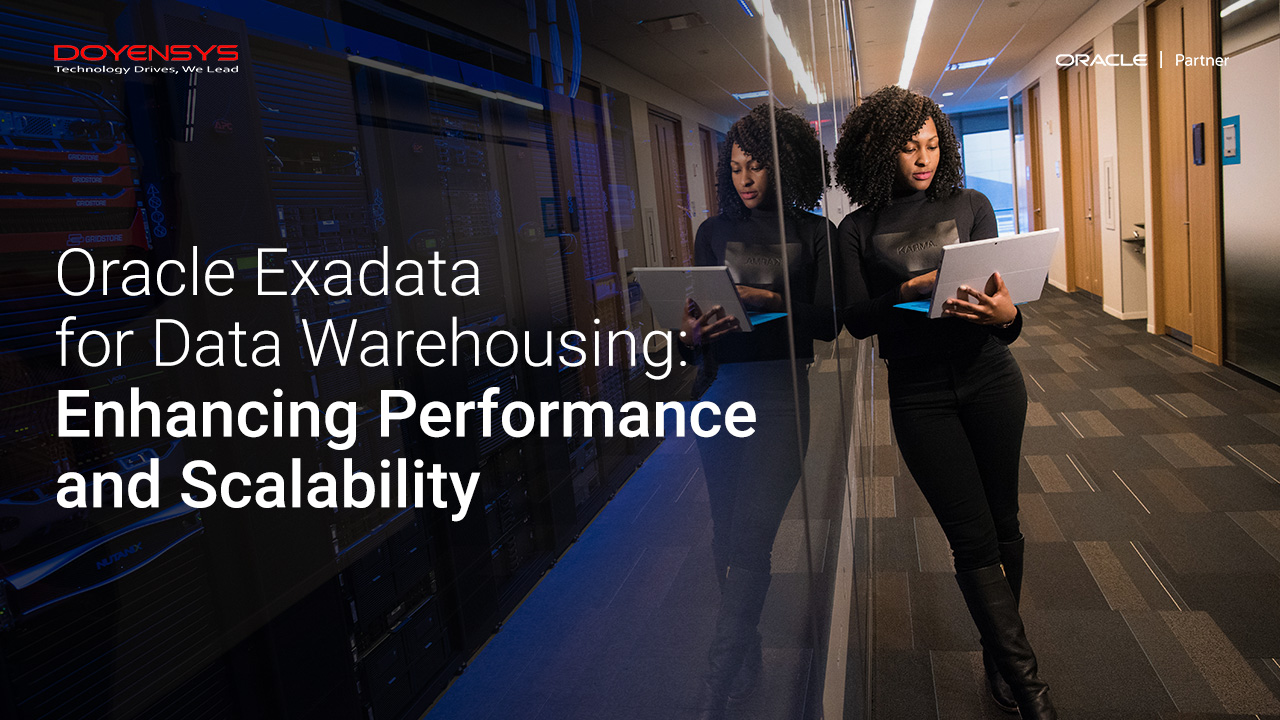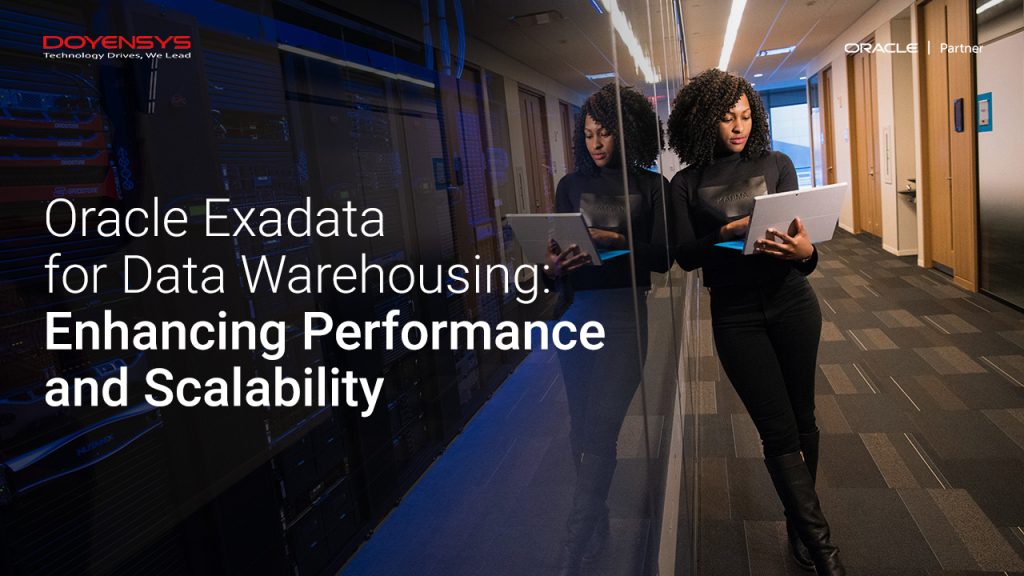
Businesses are realizing the need for an enterprise data warehouse (EDW). A genuine EDW offers a unified 360-degree perspective of the business and a robust platform for a wide range of business intelligence activities ranging from predictive analysis to near real-time strategic and tactical decision support across the enterprise.
Three key elements must be correct to ensure that the EDW achieves the desired speed and scales out as your data expands: the hardware setup, the physical data model, and the data loading method. By building these three cornerstones effectively, you can develop an EDW that can scale without continually tuning or tweaking the system.
You gain a comprehensive, high-performance hardware architecture when you choose Oracle Exadata to power your data warehouse platform. But there’s more.
 What is Oracle Exadata?
What is Oracle Exadata?
Oracle Exadata is a high-performance, high-availability, and secure business database platform that handles Oracle Database workloads of any size and criticality. Exadata’s scale-out design incorporates novel optimizations that enable transaction processing, analytics, machine learning, and mixed workloads to execute more quickly and efficiently.
Oracle Exadata is a database appliance targeted to increase the performance, availability, and cost-effectiveness of Oracle databases and data warehouses. By allowing improved business analytics, Oracle Exadata can help enterprises optimize processes, improve operations, improve customer service, and capitalize on new business prospects.
Oracle Exadata is the only platform that provides best-in-class database performance and efficiency for mixed data, analytics, data warehouse, and OLTP workloads. It allows you to operate your Oracle database and data workloads anywhere. However, you need—On-Premises Cloud for the user in your data center or any mix of such models.
Why choose Oracle Exadata for data warehousing?
The scale-out architecture of Oracle Exadata enables enterprises to independently configure computation and storage to maximize database performance and develop massive data warehouses.
Organizations can lower total expenses by combining Oracle Database workloads of any size and criticality on Exadata hardware. It would be best to power your data warehouse with Oracle Exadata for many more reasons. Here are five.
1. Delivers workload performance and scale
Every data warehouse grows, which means additional data, users, copies, and duties to handle. A general infrastructure strategy will result in a complicated design and unsustainable IT spending.
As a result, your data center footprint will be greater, which means you’ll be paying for additional electricity, cooling, and floor space. You can also be slowed down by slow data queries, which take longer to get information.
Exadata boosts employee productivity while assisting in revenue growth at a lower cost and complexity than traditional ways. You can access data more simply and connect with consumers more rapidly, with performance up to 100 times quicker. That capability enables you to combine your data warehouses into a single platform, resulting in a more than fourfold increase in density.
2. More operational efficiency
Is your company reliant on hardware from many vendors? If so, you may need to help maintain a sophisticated data warehouse infrastructure. IT personnel is stretched thin. Maintaining and optimizing each database and server & installing new applications might take months. You may also want IT expertise to manage each component.
As the number of apps, data warehouses, and databases linked with them grows, so will your administration expenses and data center footprint. Oracle Exadata improves data warehouse & app performance using reduced hardware & licenses.
Oracle Exadata enables easier updates, tweaking, patching, monitoring, and maintenance, allowing you to keep expenses under control. Because of its linear scalability, newer models are designed to run alongside previous models, allowing you to start small and grow capacity as needed.
3. Maximized availability and security
Data security and uptime are important to your organization’s business operations and revenue development. Oracle Exadata is used by businesses to perform their most critical data warehouse workloads. Exadata decreases system downtime by utilizing built-in resilience and redundancy in hardware and software.
The advantages are obvious: reduced business effect from outages, reduced IT impact from managing downtime, and consistent application and developer productivity.
4. Lower infrastructure and management costs
Oracle Exadata is the simplest approach to migrate a company’s mission-critical data workloads to the cloud with the automated Exadata Database Service and the fully managed Autonomous Database. It is built with the most recent Exadata technology and provides cloud automation and economics to clients’ data centers while also assisting them in meeting data residency rules.
With an architecture designed to function with your Oracle Databases, Oracle Exadata provides significantly more power while using far less hardware. It reduces IT complexity while increasing productivity, performance, scalability, security, and data protection.
Organizations can lower total expenses by combining data workloads and warehouses of any scale and criticality on Exadata hardware.
5. Greater automation
Running the fully managed enterprise data warehouse on Exadata infrastructure in OCI enables enterprises to quickly create cloud-native apps while eliminating infrastructure and data warehouse administration.
Businesses can extend these benefits to solve data residency, security, and latency issues by deploying Exadata Cloud@client infrastructure in client data centers. To help data warehouse owners easily manage their solutions, Oracle brings inbuilt data warehousing solutions built on Oracle Exadata.
Meet Oracle Autonomous Data Warehouse
Oracle Autonomous Data Warehouse is a solo database that is automated & created for analytic work processes. Data scientists, analysts & nonexperts may use Autonomous Data Warehouses to quickly, conveniently & affordably find business insights from any size & type of data.
Autonomous Data Warehouse, built for the cloud and optimized with Oracle Exadata, benefits from the quicker performance and saves operational expenses by an average of 63%, according to an IDC analysis. It has several advantages, such as:
- Brings a modern data platform – Powered by Oracle Exadata, this Autonomous Database serves as the foundation for a data lakehouse. This modern, open architecture allows for storing, analyzing, and comprehending your data. The data lakehouse combines the breadth, flexibility, and cheap cost of popular open-source data lake technologies with the power and depth of data warehouses.
- Comes with a data studio – Autonomous Database includes Data Studio, which provides customers with easy, self-service data management tools for loading, manipulating, analyzing, and sharing data among teams for improved collaboration. With drag-and-drop workflow features, business and data analysts can effortlessly combine data from over 100 applications, cloud services, and database sources.
- Ensures high performance – Autonomous Data Warehouse continually monitors all areas of system performance. It adapts autonomously to consistently perform even when workloads, query types, and user numbers change over time.
The Bottom Line
To assure maximum performance from your data warehouse and that it will expand as data volumes grow, you need to harness the power of Oracle Exadata. With the most recent Exadata technology, you can offer cloud automation and economics to your clients’ data warehouses while also assisting them in meeting data residency requirements.
Furthermore, you can access the most recent hardware technology and the Oracle software stack without additional licenses by utilizing Exadata Cloud Service. On-premises or on the cloud, Oracle Exadata can power your data warehouses from anywhere. Discover how Oracle Exadata solutions might benefit your unique business requirements with Doyensys, your Oracle solutions partner!
